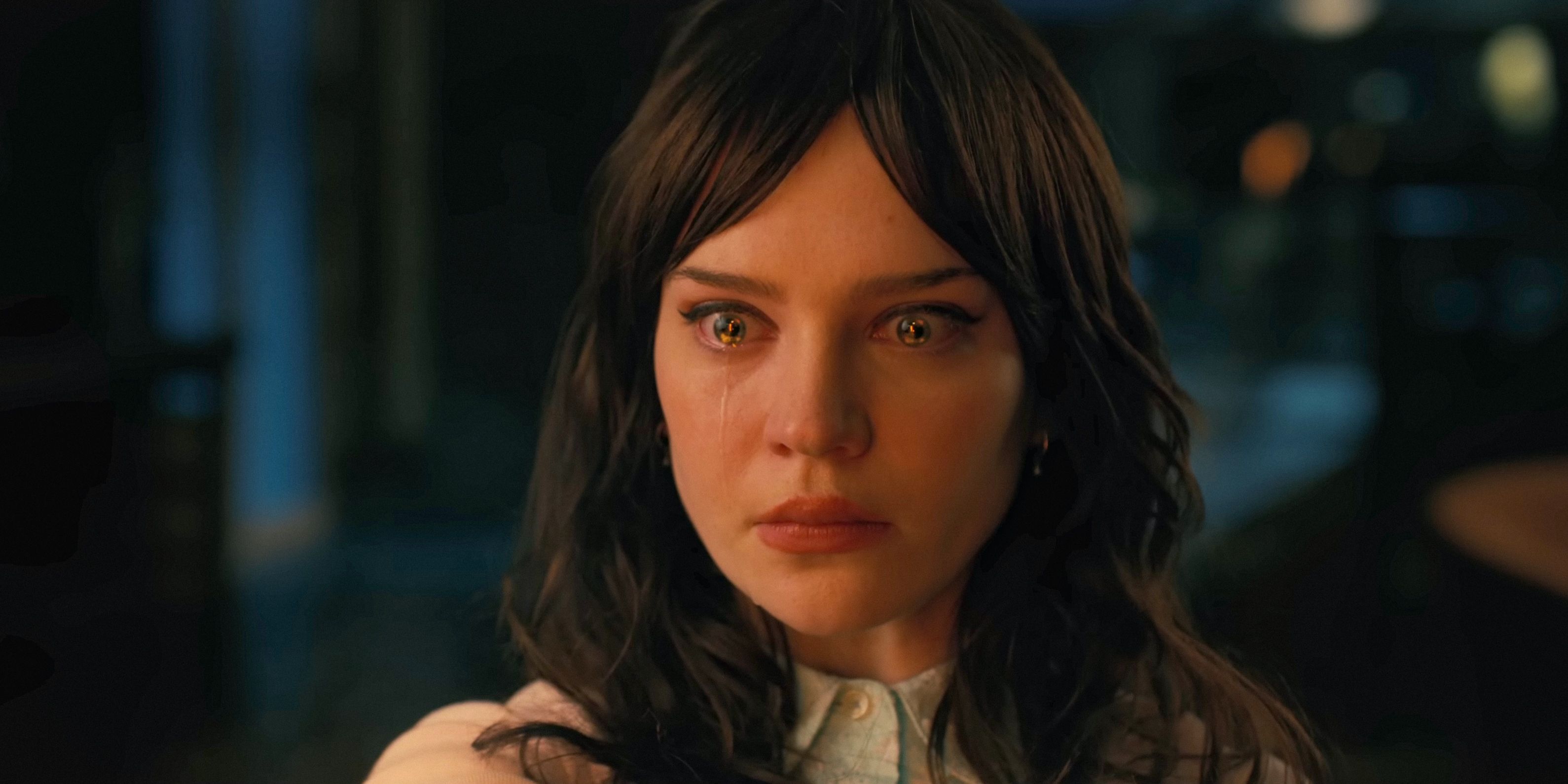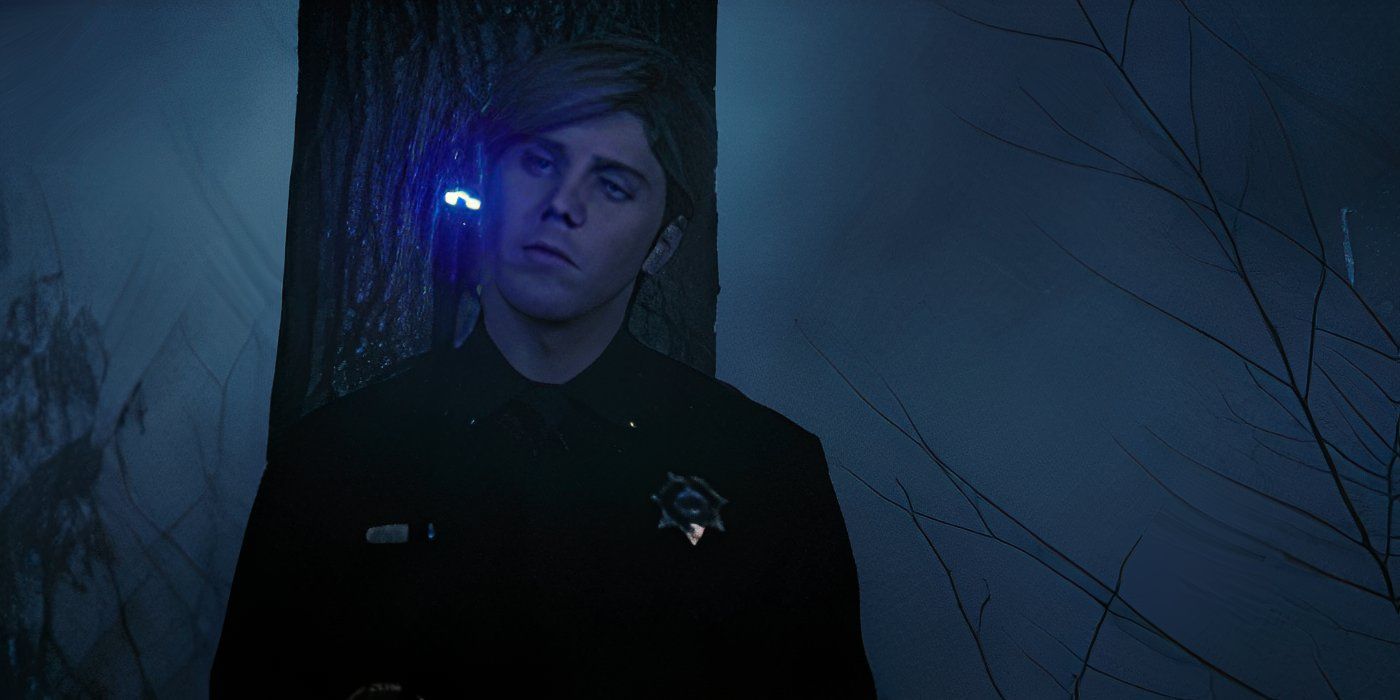The following contains spoilers for CompanionCompanion‘s twisty plot never strays too far from the underlying core themes of the film. Written and directed by Drew Hancock, Companion focuses on Sophie Thatcher’s Iris. A sweet-natured woman who is deeply in love with her boyfriend Josh, a weekend getaway with some of his old friends quickly spirals out of control for Companion‘s cast of characters. Despite some surprising sci-fi elements and unexpected turns in the story, Companion remains largely focused on the central narrative about a woman realizing her dream relationship isn’t what it appears to be.
Along the way, Companion reveals more about the supporting cast, especially in contrast to how Iris and Jack Quaid’s Josh are around one another. This, in turn, sets the stage for the true meaning of Companion, which is reflective of abusive relationships and highlights the many ways people can be manipulated into unhealthy connections. The ending of Companion even casually sets the stage for potential sequels that explore Iris and her world, which could take the metaphor into a more wide-reaching perspective.
Why Iris Kills Josh In Companion’s Ending
Josh Is Far From The Only Death In Companion
Iris reveals in Companion‘s opening monologue that she will eventually kill her boyfriend Josh, which ends up being the climactic beat of the film and completes Iris’ character arc. After being introduced as Josh’s girlfriend, Iris is revealed early on to be a robotic companion with no clear free will of her own. Even after discovering her true nature, Iris initially tries to work things out with Josh. However, he steadily reveals himself to be a controlling and vindictive man who is perfectly willing to kill her to cover his criminal tracks.
Related
3 Movies To Watch Before Companion
Before checking out the upcoming film Companion, these three films are perfect way to get into the mood for the Sophie Thatcher-led horror.
As the film progresses, Josh reveals his worst qualities while Iris steadily gains autonomy from him. By the end of the film, Josh and Iris are the last surviving members of the cast, struggling in a life-and-death fight. Although Iris has been given many reasons to hate Josh, she ultimately only kills him while he’s trying to murder her, saving her own life in the process. Iris does it with a mechanized wine cork, which had been teased earlier in the film. It’s a brutal moment, but one that the film had been steadily building to all along.
Josh’s Plan In Companion Explained
The First Death In Companion Was Part Of A Larger Scheme
One of the big twists of Companion is the true nature of Josh’s plan. Before the events of the film, Josh and his friend Kat decided to kill her boyfriend Sergey and steal his money. Reasoning that Sergey is a criminal from Kat’s descriptions of him as a “bad guy,” their plan is to have Josh hack into Iris, unlock her restrictions that keep her from harming people, and set up the circumstances that will lead Iris to kill him. The initial part of the plan works, with the “malfunctioning” Iris killing Sergey when he attempts to assault her.
However, things quickly spiral out of control when Josh tries to explain the situation to Iris instead of simply turning her off. He also discovers from Kat that Sergey wasn’t actually a criminal. This gives Iris, now aware of her robotic nature, a chance to escape, which, in turn, escalates out of control and leads to most of the deaths in the film. However, while Iris kills Eli in self-defense and eventually Josh, most of the other deaths are carried out by the robotic Patrick on the orders (both unintended and deliberate) of Josh.
How Iris Turns Patrick Against Josh
Patrick Is Companion’s Most Tragic Character
Patrick is the other robotic companion in the film, which is only revealed halfway through. Patrick was Eli’s romantic partner and robotic companion, but Josh quickly reprograms him into a willing accomplice for Companion‘s second half. However, Iris is able to use Patrick’s genuine feelings for Eli to free him from Josh’s control. This pays off an earlier scene where Eli and Patrick openly expressed their deeper feelings for one another, acknowledging their love was real even if the “memories” of their first meeting weren’t.
This gives a thematic throughline to Patrick and Eli’s tragic relationship, in direct contrast to the casually cruel and controlling way Josh had manipulated Iris.
This gives a thematic throughline to Patrick and Eli’s tragic relationship, in direct contrast to the casually cruel and controlling way Josh had manipulated Iris. Iris is able to get Patrick to remember his feelings, which gives him a chance to destroy himself rather than be used by Josh any further. Patrick does this by using a stun baton to short-circuit himself, with the happy memories of his time with Eli carrying him through his final moments.
How Companion Sets Up A Sequel
Companion Tells A Conclusive Story, But The Final Moments Are Open-Ended
Companion works very well as a self-contained film, focusing on Iris’ steadily escaping her abusive relationship and becoming her own person filtered through a robotic sci-fi lens. However, the film also sets up a larger world of possibilities. When Iris is freed in the climax and rescues one of the companion engineers from Patrick, he suggests that some people (including him) have been trying to grant more freedom to the machines. This could be expanded in the future, setting up a robot revolution.
At the time of writing, there is no confirmed sequel for Companion in development.
The film also ends with Iris going on the run with Sergey’s money, undisturbed by one of her arms being completely exposed as a robotic appendage. She even happily waves to another woman in another car, who is potentially another robot or even just a human woman caught in an unhealthy relationship. A potential sequel to Companion could revisit Iris and reveal where she has gone after the events of the film, or more importantly, what she’s decided to do with her life. Iris ends Companion in an interesting place, which could easily carry another film.
The Real Meaning Of Companion
Companion Is About Overcoming An Abusive Relationship
Despite the twisty nature of the sci-fi dark comedy, Companion ultimately has a very relatable set of themes. The film is about a young woman confronting the discovery that her seemingly perfect boyfriend is far from it. In fact, Josh reveals himself to be abusive in a number of ways. He’s controlling of her, ignoring her emotions and pushing away any of her own desires or ideas. He steadily becomes physically threatening as the film progresses, growing angrier and more defiant she becomes. Iris is a stand-in for any number of people who have been caught in an abusive relationship.
This gives audiences an extra reason to root for Iris even as she’s been forced to kill people, especially when it’s confirmed through Patrick that a genuine romance between humans and robots can happen. If Josh hadn’t been awful, a romance could have actually existed. Instead, Iris is able to become her own woman only once she moves past Josh and his manipulative tactics. Companion reinforces this by having Iris finally kill Josh, addressing it as one of her life’s most important days because she can finally be her own person, regardless of her robotic origins.
How Companion’s Ending Was Received
The Final Act Received A Mixed Response
Companion was a critical success upon release, scoring an excellent 94% on Rotten Tomatoes. However, the movie’s ending has proved to be one of the most divisive elements in the eyes of critics. While there are plenty who praise the fun twists and turns that come about in the movie’s first two acts, reviews like Vulture‘s suggest that when the movie has to sit down with its sci-fi ideas and explain things, it loses some of its fun:
Companion is only nominally a sci-fi story, set in a near future where there are self-driving cars and everything otherwise mostly looks the same, and the ending, where it has to fill out more about the workings of its technology, is the weakest part.
Another review suggested that the final act is where Companion loses some of its uniqueness, as Cinema Blend found it to be quite similar to the ending of Ex Machina. However, this comparison was not something that ruined Companion in the eyes of the reviewer, as they felt the depiction of Iris helped to present the idea of the “robot winning over the human” as a justified and crowd-pleasing one:
Despite their distinct similarities, Companion does vastly stand out from the Ex Machina ending, thanks to contextual differences that make for a dramatically contrasting tone. While Ava and Iris were both prisoners to abusive men, Ava’s escape to freedom has a more ominous quality, considering she deceptively coerces the mostly innocent Caleb into being her ally only to leave him locked in a room where he will more than likely starve to death. However, Companion paints Iris in a fully empathetic light.
Another review felt that Companion‘s ending could go down as a provocative and boundary-pushing re-examination of an old horror trope. IndieWire explored how Iris’ journey ends up resembling the typical final girl storyline from horror movies, but is given a new spin with the idea that it is a being of artificial intelligence that the audience is rooting for to survive:
The film’s salience depends on how sympathetic each viewer is to the idea that robots should have some level of human rights, but its real legacy could end up being the stress test it provides to well-established movie tropes at a moment when even our definition of personhood is up for renegotiation.

Companion
- Release Date
-
January 31, 2025
- Runtime
-
97 Minutes




